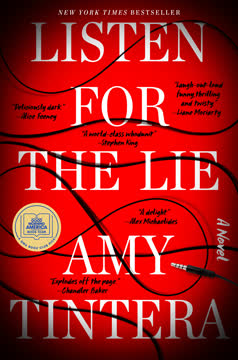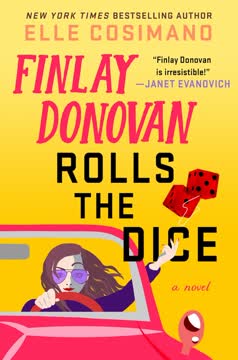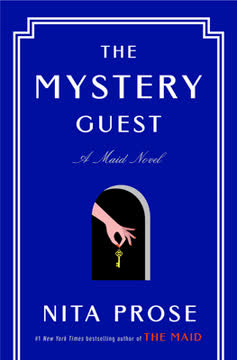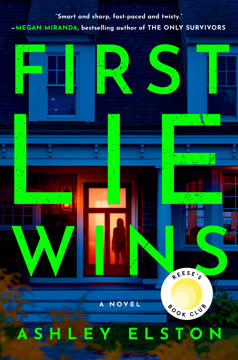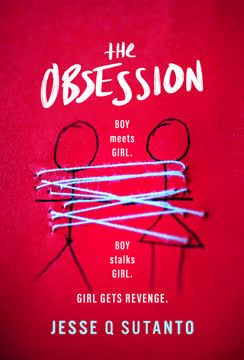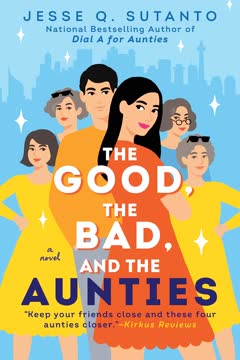Plot Summary
Vera's Morning Rituals
Vera Wong, a sixty-year-old Chinese widow, runs a nearly forgotten teahouse in San Francisco's Chinatown. Her days are marked by strict routines, early morning walks, and unsolicited advice to her distant son, Tilly. Vera's life is a blend of nostalgia for her past in Guangzhou, pride in her tea expertise, and a deep sense of isolation. Her only regular customer is Alex, an elderly man caring for his ailing wife. Vera's teahouse, once "world-famous," now languishes in obscurity, and her relationship with her son is strained. Despite her loneliness, Vera's spirit remains indomitable, her days filled with small rituals and a longing for purpose.
A Body in the Teahouse
Vera's monotonous life is shattered when she finds a dead man sprawled on her teahouse floor one morning. The police arrive, dismissing her insistence that it's murder, and treat her as a harmless old lady. Vera, however, is convinced foul play is involved, especially after she secretly pockets a flash drive from the corpse's hand. The dead man is identified as Marshall Chen, a thirty-something with a mysterious past. Vera's curiosity and sense of justice are ignited, and she resolves to solve the case herself, believing the killer will return for the missing flash drive.
Unraveling Lives
The narrative widens to include Julia, Marshall's estranged wife, who is left reeling by his sudden death and the burden of single motherhood. Julia's life is a mess of self-doubt, financial anxiety, and guilt, compounded by the police's probing questions and her own unresolved feelings about Marshall. Other characters—Riki, a guilt-ridden Indonesian programmer; Sana, a blocked artist with a vendetta; and Oliver, Marshall's overlooked twin—are drawn to the teahouse, each with their own secrets and connections to the victim. Vera, undeterred by police skepticism, begins her own investigation, drawing these disparate souls into her orbit.
The Flash Drive Secret
Vera's theft of the flash drive becomes the case's linchpin. She struggles to access its contents, enlisting her son's advice under false pretenses. The drive, she learns, is the key to unlocking Marshall's laptop, which contains evidence of his involvement in NFT art scams and a scalping bot. The drive's existence—and Vera's possession of it—makes her teahouse the focal point for those seeking answers, justice, or closure. The flash drive is both a literal and symbolic device, holding the truth about Marshall's double life and the motives of those around him.
Suspects Assemble
Vera's investigation brings together a cast of unlikely suspects: Riki, who claims to be a Buzzfeed reporter but is actually seeking retribution for being scammed by Marshall; Sana, posing as a podcaster but really a victim of Marshall's art theft; Oliver, the twin brother with a lifetime of resentment; and Julia, the grieving widow with secrets of her own. Vera, with her relentless energy and motherly meddling, orchestrates their interactions, convinced that the killer is among them. As they share meals, stories, and suspicions, bonds form and old wounds are exposed.
The Art of Deception
Each character's backstory is gradually revealed: Riki's desperation to support his gifted brother led him to create a scalping bot for Marshall, only to be cheated; Sana's artistic dreams were crushed when Marshall stole her work and sold it as NFTs; Oliver's lifelong inferiority complex and anger at Marshall simmer beneath the surface; Julia's marriage was a web of manipulation and emotional abuse. Vera's teahouse becomes a confessional, a place where secrets are spilled over tea and food, and where the line between suspect and victim blurs.
Tea, Grief, and Guilt
As the group spends more time together, their initial suspicion gives way to empathy. Vera's relentless hospitality—her cooking, her advice, her insistence on togetherness—creates a surrogate family. Julia rediscovers her passion for photography, Sana begins to heal her creative block, Riki finds acceptance, and Oliver confronts his past. The teahouse, once a symbol of Vera's loneliness, becomes a haven for healing. Yet, the mystery of Marshall's death and the break-in at the teahouse loom, unresolved.
The Unlikely Detectives
Vera's amateur sleuthing, aided by her new friends, uncovers more about Marshall's shady dealings. The break-in at the teahouse, initially thought to be the killer's attempt to retrieve the flash drive, is later revealed to be Vera's own doing—a desperate ploy to keep the group united and the investigation alive. The group's efforts, though often bumbling, bring them closer together and closer to the truth, as they piece together Marshall's web of lies, theft, and betrayal.
The Break-In
The staged break-in at the teahouse throws the group into disarray. Vera's actions, meant to galvanize the investigation, instead sow confusion and mistrust. The police become more involved, and the group's secrets threaten to unravel. Yet, in the aftermath, the group rallies to support Vera, cleaning up the teahouse and reaffirming their commitment to one another. The break-in becomes a turning point, forcing each character to confront their own guilt and complicity.
Confessions and Connections
One by one, the group members confess their secrets: Riki admits to building the bot; Sana reveals her obsession with reclaiming her stolen art; Oliver confesses to planting drugs in Marshall's bag in a failed attempt at revenge; Julia confronts her own complicity in her unhappy marriage. These confessions, rather than tearing the group apart, deepen their bonds. Vera, ever the matriarch, guides them through their pain, offering forgiveness and a path forward.
The Truth in the Sand
Sana, with Vera's encouragement, begins to draw again—first in the sand at Ocean Beach, then on the walls of the renovated teahouse. Her art becomes a metaphor for the group's healing: impermanent, vulnerable, but beautiful. The act of creation, shared with Emma and the others, helps Sana reclaim her identity and inspires the group to rebuild the teahouse as a community space. Vera's vision of family and belonging is realized, even as the mystery of Marshall's death lingers.
The Dinner Party Reveal
Vera, channeling her inner detective, hosts a black-tie dinner party to unmask the killer. Tensions run high as old grievances and new revelations surface. Julia discovers Oliver's manuscript, which mirrors their tangled relationships and hints at murderous intent. Accusations fly, and the group teeters on the brink of collapse. Vera's own secrets—her tampering with evidence, her orchestrated break-in—are exposed, and she is cast out, her dream of family seemingly destroyed.
The Real Killer
In the aftermath, Vera, despondent and alone, pieces together the final clues. She realizes that Alex, her loyal customer and Oliver's father, is the true killer. Consumed by grief and disillusionment after learning of Marshall's cruelty, Alex poisoned his own son with bird's nest tea, exploiting Marshall's allergy. The revelation is devastating: the killer was not a villain, but a broken father pushed to the edge. The group, now a found family, must reckon with the tragedy and the limits of justice.
Healing and New Beginnings
With the truth revealed, the group begins to heal. Vera, hospitalized and frail, is surrounded by her new family—Julia, Emma, Sana, Riki, Oliver, and even Tilly. Each character finds closure: Julia's photography business flourishes, Sana's art is celebrated, Riki's brother joins him in America, Oliver and Julia repair their friendship, and Vera's teahouse is reborn as a vibrant community hub. The pain of the past lingers, but it is transformed by love, creativity, and forgiveness.
The Teahouse Reborn
The renovated teahouse, adorned with Sana's mural and filled with laughter, food, and art, becomes a symbol of renewal. Vera, once alone and purposeless, is now the heart of a chosen family. The teahouse, once empty, is filled with customers drawn by its story, its art, and its warmth. The group's journey—from suspicion and grief to connection and hope—culminates in a celebration of found family, resilience, and the healing power of community.
Characters
Vera Wong
Vera is a sixty-year-old Chinese widow, fiercely independent and disciplined, whose life revolves around her failing teahouse and her estranged son. She is nosy, opinionated, and unyielding, but also deeply compassionate and lonely. Vera's need to be needed drives her to insert herself into the lives of others, offering advice and care whether wanted or not. Her transformation from isolated shopkeeper to the matriarch of a found family is the novel's emotional core. Vera's psychological complexity lies in her simultaneous vulnerability and strength—her loneliness is both her weakness and her superpower, propelling her to create the community she craves.
Julia Chen
Julia is Marshall's widow, a stay-at-home mother paralyzed by guilt, insecurity, and the trauma of an emotionally abusive marriage. Her journey is one of rediscovering her own worth and agency, first through Vera's tough love and later through her own passion for photography. Julia's relationship with her daughter Emma is both her anchor and her greatest challenge. Her development is marked by a gradual shedding of shame and fear, culminating in her emergence as a confident, creative, and loving mother and friend.
Riki Herwanto
Riki is an Indonesian programmer desperate to support his gifted younger brother. His involvement with Marshall—building a scalping bot and being cheated—leaves him wracked with guilt and self-loathing. Riki's psychological struggle is between his sense of responsibility and his fear of being exposed as a fraud or criminal. Through Vera's acceptance and the group's support, Riki learns to forgive himself and embrace vulnerability, finding love and belonging with Sana and the others.
Sana Singh
Sana is a young artist whose career and confidence were shattered when Marshall stole her work and sold it as NFTs. Her creative block is both literal and symbolic—a manifestation of her trauma and self-doubt. Sana's journey is one of reclaiming her voice and agency, first through confession and then through creation. Her relationship with Vera, who becomes a surrogate mother, and with Riki, who shares her pain, helps her heal. Sana's art becomes the catalyst for the group's transformation and the teahouse's rebirth.
Oliver Chen
Oliver is Marshall's twin, forever in his brother's shadow and burdened by a lifetime of neglect and self-doubt. His complicated feelings for Julia and his resentment toward Marshall drive much of his internal conflict. Oliver's psychological arc is about confronting his own passivity and guilt, ultimately finding the courage to confess his secrets and repair his relationships. His friendship with Julia and his role in the group's healing are central to the novel's resolution.
Marshall Chen
Marshall, though dead for most of the novel, is the catalyst for the story's events. In life, he was a charming con artist, emotionally abusive husband, and absent father. His scams, betrayals, and cruelty leave a trail of wounded people. Marshall's psychological complexity lies in his ability to both attract and destroy, and his death forces those around him to confront their own pain and complicity.
Alex Chen
Alex is Oliver and Marshall's father, a regular at Vera's teahouse and a symbol of old-world values and filial piety. His idealization of Marshall and neglect of Oliver are rooted in his own grief and longing for connection. Alex's eventual confession to killing Marshall is both shocking and deeply human—a tragic act born of love, disappointment, and the unbearable weight of loss.
Emma Chen
Emma is Julia and Marshall's young daughter, whose presence brings out the best in those around her. Her bond with Vera and her gradual blossoming mirror the healing of the group. Emma represents hope, resilience, and the possibility of breaking cycles of pain.
Tilly (Tilbert) Wong
Tilly is Vera's son, a busy lawyer who keeps his mother at arm's length. His relationship with Vera is strained by cultural and generational gaps, but he ultimately steps up to support her and the group, providing legal help and emotional closure.
Officer Gray
Officer Gray is the police investigator on Marshall's case. Initially dismissive of Vera's meddling, she comes to respect the group's efforts and plays a key role in the official resolution of the case. Her presence grounds the story in reality and provides an external perspective on the group's dynamics.
Plot Devices
Found Family and Community
The novel's central device is the creation of a found family among strangers united by grief, guilt, and the search for truth. Vera's teahouse becomes the crucible where wounds are exposed and healed, and where each character finds acceptance and purpose. The narrative structure alternates between multiple perspectives, deepening empathy and connection.
Amateur Sleuthing and Misdirection
Vera's transformation into an amateur detective drives the plot, with classic mystery tropes—suspect lists, dinner party reveals, hidden clues—used both sincerely and satirically. The story is rich in misdirection: each character is given motive and opportunity, and the true killer is hidden in plain sight. The break-in, the flash drive, and the staged evidence all serve to complicate the investigation and keep readers guessing.
Symbolism of Tea and Art
Tea is both literal sustenance and a metaphor for comfort, tradition, and connection. Vera's tea rituals bring people together and create space for vulnerability. Similarly, art—Sana's paintings, Julia's photography—symbolizes the reclamation of identity and the transformative power of creation. The act of making and sharing becomes a path to healing.
Intergenerational and Cultural Tension
The novel explores the tension between immigrant parents and their Americanized children, between tradition and modernity, and between individual desire and communal responsibility. These tensions are embodied in Vera's relationship with Tilly, Julia's struggle for independence, and the group's negotiation of cultural differences.
Confession and Redemption
The plot is structured around a series of confessions—each character must confront their own guilt, shame, and complicity. These moments of vulnerability are both plot revelations and psychological turning points, allowing for forgiveness and growth.
Analysis
Vera Wong's Unsolicited Advice for Murderers is a warm, witty, and deeply human reimagining of the cozy mystery, using the framework of a whodunit to explore themes of loneliness, found family, and the healing power of community. At its heart, the novel is less about solving a murder than about the ways broken people can come together to create something beautiful out of pain. Through Vera's relentless meddling and motherly love, the story celebrates the resilience of the human spirit, the importance of intergenerational connection, and the necessity of forgiveness—both of others and of oneself. The book's lessons are clear: healing is a communal act, creativity is a form of survival, and even the most unlikely group of strangers can become a family. In a world marked by isolation and suspicion, Vera's teahouse offers a vision of hope, belonging, and the transformative magic of a good cup of tea.
Last updated:
FAQ
Synopsis & Basic Details
What is Vera Wong's Unsolicited Advice for Murderers about?
- A Cozy Mystery Unfolds: The novel centers on Vera Wong, a sixty-year-old Chinese widow and teahouse owner, whose disciplined, solitary life is upended when she discovers a dead body in her shop. Convinced it's murder despite police skepticism, Vera embarks on her own amateur investigation, drawing a motley crew of suspects—each with hidden connections to the deceased—into her orbit.
- Found Family Forged: As Vera meddles, cooks, and offers unsolicited advice, her initial suspects—Marshall Chen's estranged wife Julia, his twin brother Oliver, and two of his scam victims, Riki and Sana—gradually form an unlikely "found family." Their shared grief, guilt, and secrets create a unique bond, transforming Vera's lonely teahouse into a vibrant community hub.
- Healing Through Connection: Beyond the murder mystery, the story explores themes of loneliness, intergenerational connection, and personal redemption. Each character confronts their past traumas and insecurities, finding healing and purpose through their relationships with Vera and each other, culminating in the revelation of the killer and the rebirth of the teahouse.
Why should I read Vera Wong's Unsolicited Advice for Murderers?
- Charming, Meddling Protagonist: Vera Wong is an unforgettable character whose sharp wit, unwavering discipline, and deeply caring nature make her a joy to follow. Her "unsolicited advice" and unique perspective provide constant humor and warmth, driving the narrative with delightful force.
- Heartfelt Exploration of Connection: The novel beautifully portrays the formation of a "found family" among disparate individuals, offering a poignant look at how shared vulnerability and genuine care can heal past wounds and build strong, supportive bonds. It's a story about belonging and acceptance.
- Unique Blend of Genres: Seamlessly combining cozy mystery elements with rich character development and cultural insights, the book offers a fresh take on the whodunit. Readers seeking a story with humor, emotional depth, and a satisfying resolution will find it a rewarding experience.
What is the background of Vera Wong's Unsolicited Advice for Murderers?
- San Francisco Chinatown Setting: The story is deeply rooted in San Francisco's Chinatown, portraying its aging buildings, traditional shops, and the lives of its immigrant residents. This cultural backdrop informs Vera's character, her traditional values, and her struggle to maintain her teahouse in a changing world.
- Intergenerational and Cultural Tension: The narrative frequently highlights the clash and eventual reconciliation between traditional Chinese values (filial piety, discipline, food as love) embodied by Vera and Alex, and the more modern, Americanized perspectives of the younger characters like Tilly, Julia, Riki, and Sana. This cultural context enriches character motivations and relationship dynamics.
- Contemporary Social Commentary: The plot subtly incorporates modern issues such as online scams (NFTs, scalping bots), the gig economy, and the pressures faced by young adults in competitive fields, grounding the mystery in a relevant, contemporary setting while exploring the human cost of these phenomena.
What are the most memorable quotes in Vera Wong's Unsolicited Advice for Murderers?
- "Late mornings, Vera believes, are only for toddlers and Europeans.": This opening line immediately establishes Vera's rigid discipline and humorous, opinionated worldview, setting the tone for her character and the novel's lighthearted yet firm narrative voice. It highlights her cultural perspective on productivity.
- "Nobody sniffs out wrongdoing quite like a suspicious Chinese mother with time on her hands.": Vera's self-assessment perfectly encapsulates her transformation into an amateur sleuth, revealing her core motivation for investigation and her unique "superpower" in the story. This quote defines Vera's unsolicited advice for murderers.
- "Unrealized dreams are one of saddest things in life. Well, after serious illness and death and all that.": Vera's poignant reflection to Julia captures the novel's deeper emotional themes, acknowledging the profound impact of unfulfilled aspirations while maintaining her characteristic pragmatic humor. This quote speaks to the themes in Vera Wong.
What writing style, narrative choices, and literary techniques does Jesse Q. Sutanto use?
- Omniscient, Humorous Narration: Sutanto employs a close third-person omniscient narration, often dipping into the characters' internal thoughts with a witty, often sarcastic, tone. This allows for a deep understanding of each character's inner world, particularly Vera's, whose unique voice and "unsolicited advice" drive much of the humor and charm.
- Alternating Perspectives & Character-Driven Plot: The narrative frequently shifts between the viewpoints of Vera, Julia, Riki, Sana, and Oliver. This choice builds empathy for each "suspect," revealing their individual backstories and motivations, and transforming the mystery from a simple whodunit into a rich character study. This technique enhances the psychological complexities.
- Subversion of Cozy Mystery Tropes: While embracing elements of a cozy mystery (amateur sleuth, quirky characters, community setting), Sutanto subverts expectations with the killer's identity and motive, which are rooted in profound grief and disillusionment rather than malice. The "red herrings" are not just plot devices but reflections of the characters' hidden guilt and trauma, adding depth to the Vera Wong analysis.
Hidden Details & Subtle Connections
What are some minor details that add significant meaning?
- Vera's "Pig" Horoscope: Vera's opening chapter states she "is a pig, but she really should have been born a rooster." While roosters are known for waking early, the Chinese horoscope describes pigs as "diligent and compassionate" and "the ones to call upon when sincere advice is needed." This subtle detail foreshadows Vera's true nature and her eventual role as a compassionate matriarch, offering genuine advice and care, rather than just being a rigid early riser.
- The "World-Famous" Teahouse Name: Tilly's early jabs at the teahouse's name, calling it "misrepresentation" and noting "nobody knows of its existence," highlight Vera's initial delusion and loneliness. By the end, the teahouse does become "world-famous" through community effort and genuine connection, transforming the ironic name into a symbol of Vera's achieved purpose and the power of found family. This detail is key to understanding Vera Wong's symbolism.
- Julia's Packed Trash Bags: When the police first visit Julia, she has "huge trash bags lined up behind the front door" filled with Marshall's belongings. This seemingly minor detail, initially attributed to "spring cleaning," subtly foreshadows Marshall's imminent departure before his death, revealing the true state of their marriage and Julia's pre-existing emotional turmoil, which Oliver later confirms.
What are some subtle foreshadowing and callbacks?
- Oliver's Manuscript as a Clue: Oliver's manuscript, initially dismissed as a forgotten personal project, subtly foreshadows his deep-seated resentment towards Marshall and his unrequited feelings for Julia. The narrative's later revelation that the manuscript depicts a twin killing his brother for a woman ("David ended up strangling Randall in the story") serves as a powerful, albeit misleading, piece of foreshadowing for Oliver's potential guilt and his true motivations.
- Marshall's Allergic Reaction History: Oliver's detailed recollection of Marshall's severe allergic reaction to a "goose-down duvet" as a child is a crucial piece of foreshadowing. This seemingly innocuous anecdote about "sausage" fingers and a rash directly sets up the eventual reveal of Marshall's cause of death—anaphylactic shock due to bird dander—making the killer's method both personal and tragically ironic. This is a key detail in the Vera Wong ending explained.
- Vera's "Instincts" about Murder: From the moment she finds Marshall's body, Vera insists it's "murder," sensing a "very bad aura" or "vibes." While initially played for comedic effect and dismissed by the police, her unwavering conviction, despite the official ruling of accidental death, subtly foreshadows the truth. Her "instincts" are ultimately proven correct, validating her unique approach to the investigation and her role as an amateur sleuth.
What are some unexpected character connections?
- Alex Chen's Dual Role: Alex, initially presented as Vera's sole, gentle customer and a fellow lonely elder, is unexpectedly revealed to be Marshall's father and the killer. This connection is a profound twist, transforming a seemingly minor character into the central figure of the tragedy and highlighting the devastating impact of Marshall's actions on his own family. This is crucial for Alex Chen's motivations.
- Oliver and Julia's Shared Past: The novel gradually reveals that Oliver and Julia were once best friends in high school, with Oliver harboring unrequited feelings for her. This deep, unspoken history adds layers to their interactions post-Marshall's death, explaining Oliver's quiet loyalty and Julia's initial discomfort, and setting the stage for their eventual reconciliation as friends. This connection is vital for Julia Chen's character analysis and Oliver Chen's motivations.
- Riki and Sana as Marshall's Victims: Riki and Sana, who initially connect under false pretenses (reporter and podcaster), discover they are both victims of Marshall's scams—Riki for building a scalping bot he wasn't paid for, and Sana for having her art stolen and sold as NFTs. This shared trauma forms the basis of their romantic relationship and their mutual healing, creating an unexpected bond beyond the murder investigation.
Who are the most significant supporting characters?
- Winifred, the "French Patisserie" Owner: Winifred, Vera's rival neighbor, initially appears as a comedic foil, constantly correcting Vera about her "patisserie" and subtly peeping into Vera's shop. However, she becomes significant by reporting the break-in to the police, inadvertently pushing the official investigation forward and highlighting Vera's isolation before her found family forms. Her presence underscores the community dynamics in Chinatown.
- Gladys, the Hospital Roommate: Gladys, Vera's snarky hospital roommate, serves as a humorous, external observer of Vera's newfound "family." Her "snide" remarks about Vera's "varied stream of visitors" provide an outside perspective on the unusual bonds Vera has forged, subtly validating the depth of these relationships despite their unconventional origins.
- Emma Chen, the Catalyst for Change: While young, Emma is a profoundly significant supporting character. Her quiet nature and initial clinginess reflect Julia's emotional state, but her rapid blossoming under Vera's care (eating new foods, engaging with others) symbolizes Julia's own healing and the positive impact of Vera's presence. Emma's innocent observations and demands ("The pig poops!") also provide moments of levity and genuine connection.
Psychological, Emotional, & Relational Analysis
What are some unspoken motivations of the characters?
- Vera's Quest for Purpose: Beyond solving the murder, Vera's deepest unspoken motivation is to find purpose and combat her profound loneliness after her husband's death and her son's emotional distance. Her relentless meddling and "unsolicited advice" are her ways of feeling needed and creating the "found family" she desperately craves, transforming her teahouse into a hub of connection. This is central to Vera Wong's character analysis.
- Julia's Desire for Validation: Julia's unspoken motivation is to reclaim her self-worth and agency, shattered by years of emotional abuse and Marshall's constant belittling. Her initial self-doubt and apologies stem from this. Her journey into photography, encouraged by Vera, is not just about a career but about validating her own talent and identity, independent of Marshall's judgment. This is key to Julia Chen's motivations.
- Oliver's Need for Recognition: Oliver's lifelong resentment of Marshall stems from being the "knockoff twin" and constantly overlooked by his father. His unspoken motivation is to finally be seen and valued for himself, separate from Marshall's shadow. His actions, including planting the drugs, are a desperate attempt to assert his own agency and expose Marshall's true nature, even if it means self-sabotage. This reveals Oliver Chen's motivations.
What psychological complexities do the characters exhibit?
- Marshall's Charismatic Manipulation: Marshall, though deceased, is a psychologically complex antagonist. He's not just a "bad guy" but a master manipulator who expertly preys on others' vulnerabilities (Sana's artistic insecurity, Riki's financial desperation, Julia's self-doubt, Alex's idealization). His ability to present different "masks" to different people—the loving son, the successful entrepreneur, the supportive partner—highlights the insidious nature of his psychological abuse and con artistry.
- Sana's Creative Block as Trauma Response: Sana's inability to paint after Marshall stole her art is a profound psychological complexity. Her "creative block" is a direct manifestation of her trauma, shame, and the feeling that a part of her identity was stolen. Her healing process, through drawing on sand and eventually painting the teahouse mural, symbolizes her reclaiming agency and transforming her pain into new forms of expression. This is a core aspect of Sana Singh's character analysis.
- Alex's Idealization and Disillusionment: Alex's psychological complexity lies in his deep-seated idealization of Marshall, which blinded him to his son's true nature and led him to neglect Oliver. His grief over Marshall's death is compounded by the shattering disillusionment when he discovers Marshall's cruelty. His act of murder, born from this profound emotional collapse, reveals the tragic psychological toll of Marshall's deception on his own father. This explains Alex Chen's motivations.
What are the major emotional turning points?
- Julia's Unfettered Laughter: A significant emotional turning point for Julia occurs when she laughs freely with Vera and Emma while making noodles, realizing Marshall is "not coming home" to "bitch about the mess." This moment marks her shedding years of suppressed joy and fear, signaling the beginning of her emotional liberation and the reclamation of her authentic self. This is a key emotional turning point for Julia Chen.
- Sana's Tears at the Pier: When Sana confesses her truth to Vera at the pier, she "bursts into tears" and feels "every wall she'd painstakingly built over the years crumbling." This raw emotional release, coupled with Vera's compassionate hug, is a cathartic turning point, allowing Sana to process her trauma and begin healing her creative block, leading to her return to art. This is crucial for Sana Singh's character analysis.
- Riki's Relief at Ocean Beach: Riki's emotional turning point comes when Vera dismisses his guilt over punching Marshall, telling him his "punch is not as strong as you think." This simple statement, combined with Vera's acceptance, lifts the "anvil" of self-blame he'd carried, allowing him to feel "lighter" and begin to forgive himself, paving the way for his relationship with Sana. This highlights Riki Herwanto's emotional journey.
How do relationship dynamics evolve?
- Vera and Tilly's Reconciliation: Initially strained by Tilly's perceived neglect and Vera's unsolicited advice, their relationship evolves from distant obligation to genuine care. Tilly's concern during Vera's hospital stay and his legal support for Oliver and Alex demonstrate his filial piety, while Vera's acceptance of his help and her pride in his accomplishments show a softening of her expectations, leading to a more balanced, loving bond. This is a key aspect of Vera Wong's themes.
- Julia and Oliver's Friendship Rebirth: Their relationship, severed by Marshall's manipulation and Oliver's unrequited feelings, is painstakingly rebuilt. Through shared grief and the revelation of Oliver's manuscript, they confront past hurts. Oliver's sincere apology and Julia's eventual forgiveness allow them to reclaim their "lifelong friends" status, demonstrating the healing power of honest communication and mutual support. This is central to Julia Chen's character analysis and Oliver Chen's motivations.
- Sana and Riki's Romantic Connection: Their dynamic shifts from wary "suspects" to a supportive romantic partnership. Their shared experience as Marshall's victims and their confessions of guilt create a deep empathy. Vera's matchmaking, though meddling, facilitates their connection, allowing them to heal together and build a future based on mutual understanding and shared values. This highlights the evolving relationship dynamics in Vera Wong.
Interpretation & Debate
Which parts of the story remain ambiguous or open-ended?
- The Future of Alex Chen's Sentence: While Alex confesses to Marshall's murder, the epilogue states his trial is "still ongoing" and Tilly's associate says it's going "about as well as these things can go." This leaves the exact legal outcome ambiguous, allowing readers to ponder the complexities of justice for a sympathetic killer driven by grief and disillusionment. It invites debate on whether Alex will face a harsh sentence or a more lenient one given the circumstances.
- The Long-Term Impact of Trauma: While the characters experience significant healing and growth, the novel leaves open the long-term impact of their past traumas. For instance, Sana's creative block is overcome, but the psychological scars of Marshall's theft may linger. Similarly, Julia's newfound confidence is strong, but the years of emotional abuse could resurface. The story suggests healing is a continuous journey, not a definitive end point.
- The Teahouse's Enduring Success: The epilogue shows Vera's teahouse thriving with new customers, but the sustainability of this success is left somewhat open. While the initial surge is due to viral marketing and Sana's art, the challenge of maintaining a "world-famous" business in a competitive city remains. This invites interpretation on whether the teahouse's rebirth is a permanent transformation or a hopeful new beginning that still requires ongoing effort.
What are some debatable, controversial scenes or moments in Vera Wong's Unsolicited Advice for Murderers?
- Vera's Tampering with Evidence: Vera's decision to secretly take the flash drive from Marshall's hand and later smash her own shop to create a "break-in" is highly debatable. While presented with comedic intent and justified by Vera's belief in police incompetence, these actions are illegal and could have serious consequences. Readers might debate whether her "good intentions" excuse her "irresponsible" behavior, or if it undermines the integrity of her amateur sleuthing. This is a key point for Vera Wong's analysis.
- Alex Chen's Motive for Murder: Alex's confession that he killed his son, Marshall, out of profound disillusionment and a desire to protect Julia and Emma, is a controversial moment. It challenges traditional notions
Review Summary
Vera Wong's Unsolicited Advice for Murderers is a heartwarming and humorous cozy mystery featuring a 60-year-old Chinese tea shop owner who investigates a murder in her store. Readers praised Vera's quirky character, the diverse cast, and the found family themes. Many enjoyed the audiobook narration and the mouthwatering food descriptions. While some found the mystery predictable, most appreciated the character-driven story and its blend of comedy and warmth. A few critics felt the book was too long or unrealistic, but overall, it received positive reviews.
Vera Wong Series
Similar Books
Download PDF
Download EPUB
.epub digital book format is ideal for reading ebooks on phones, tablets, and e-readers.

![Vera Wong's Guide to Snooping [On a Dead Man] Summary](https://files.sobrief.com/social/cover_vera-wongs-guide-to-snooping-on-a-dead-man_360px_1747304022.jpg)


